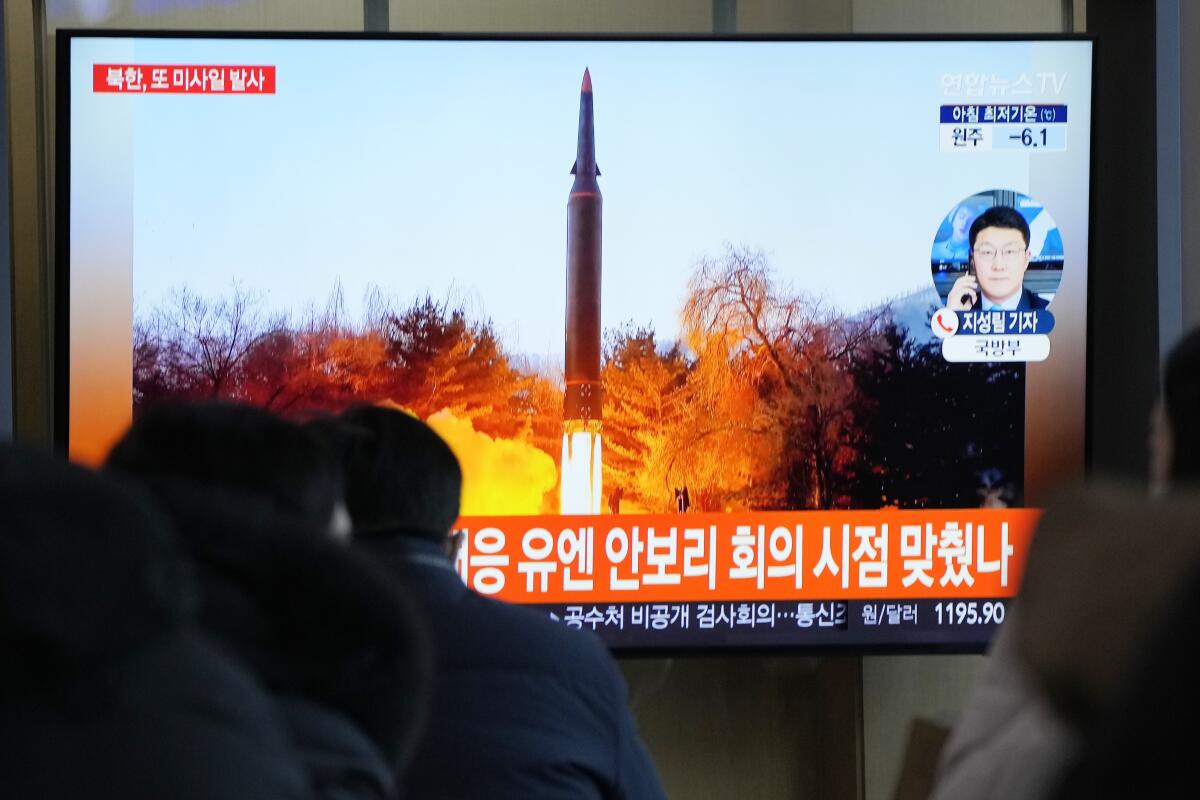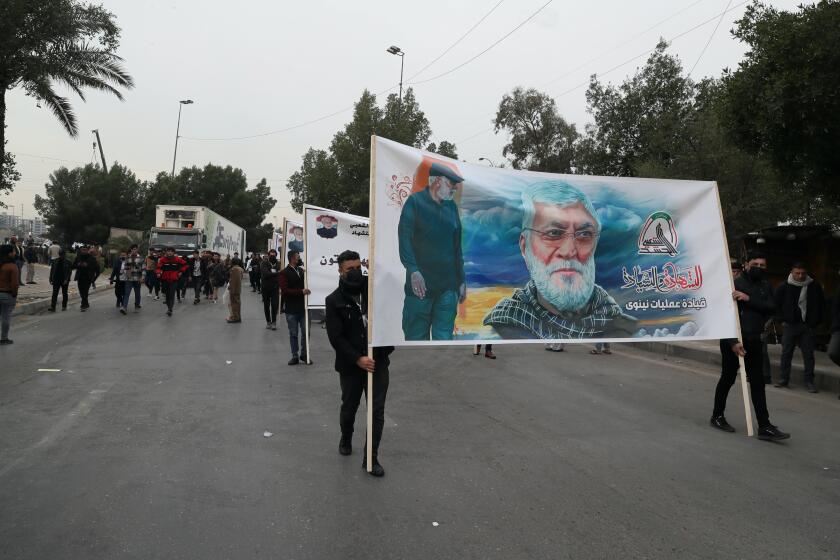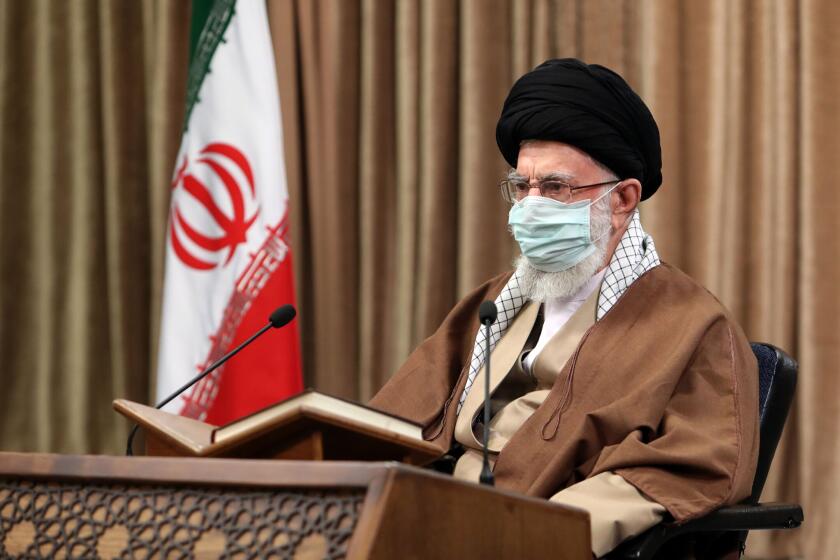Op-Ed: What failed U.S.-North Korea nuclear talks can teach us about negotiating with Iran

- Share via
The nuclear talks between the U.S. and Iran are a rare second chance to use negotiations to make sure Iran does not get a nuclear device. As government officials, we participated in high-level nuclear talks with North Korea more than 20 years ago. Based on those discussions, we believe now is the best — and likely only — opportunity to accomplish this task peacefully because Iran still does not have a nuclear weapon.
The alternative? Iran becomes a nuclear weapons state like North Korea, and we risk catastrophic conflict in the Middle East to stop it.
If you think a nuclear North Korea is a problem, Iran with the bomb will be so much worse.
Recent events have proved how important nuclear talks are. North Korea launched its second ballistic missile Tuesday — its second such test in a week — as the country pursues the development of hypersonic missiles amid stalled nuclear talks. Meanwhile, officials close to the talks with Iran warned late last month that the window to negotiate a return to the 2015 Iran nuclear deal is nearly shut.
In five essential respects Iran and North Korea are eerily similar. It has nothing to do with their respective cultures and histories. It has everything to do with organizational behavior, the difficulty of building a viable nuclear weapon — and politics.
First, Iran in 2021 is like North Korea more than two decades before. Iran does not yet have a nuclear weapons capability and does not know when it will. In addition, Iran is concerned about preemptive attacks from enemies, just as North Korea was. Developing a nuclear weapon costs time and money. From a negotiating standpoint, it is so much easier to get a country to agree to give up the possibility of nuclear weapons in exchange for something concrete, such as sanctions relief and security assurances.
Yemen’s Houthi rebels say they seized an Emirati ship in the Red Sea in the latest signs of Mideast tensions.
But once Iran has a nuclear device, it becomes more difficult, if not impossible, to get them to give it up. This is a fundamental insight that many did not fully recognize with respect to North Korea long ago.
Second, the perfect often becomes the enemy of the good. The previous Iran nuclear deal could have been stronger — and a new deal may yet still be. But holding out for a better deal, even for legitimate policy reasons, can be a never-ending spiral and therefore has limited value in high-stakes negotiations. No side gets everything it wants. That is usually the case when the U.S. enters into nuclear-related agreements.
Robert Gallucci, the chief American negotiator with North Korea in 1994, said that critics were unhappy with the deal he brought back to the U.S. because we gave too much and got too little. However, no one had a better alternative to stop the North’s nuclear program. The germane questions now are: Will we get enough from Iran? And will an agreement give us time to come to a more durable solution?
Third, Iran’s leadership is not a monolith. Complicated international talks are not only negotiations between governments, but also debates between power centers domestically — typically those who favor opening up and engaging versus those who wish to stay closed and confront. It took time to understand this when the U.S. was engaged in nuclear-related talks with North Korea from 1998 to 2001. Kim Jong Il, then the country’s leader, had to cater to key constituencies, which limited his flexibility. Practically, this meant delays, contradictory statements and unexpected behaviors. We need to anticipate more of these same elements from Iran. Failure to do so may cause us to jump to wrong conclusions.
Fourth, the U.S. withdrawal from the Iran deal in 2018 empowered Iran hardliners, who argue that negotiations with the U.S. are a waste of time and that Iran — by remaining engaged in talks — loses critical defense development opportunities. This also happened in North Korea. When the U.S. reversed policy in 2001, and the 1994 nuclear deal subsequently fell apart, we believe the hardliners think they were proved right: North Korea had given up eight years’ worth of weapons-grade plutonium production in exchange for just a few million metric tons of heavy fuel oil.
If Iran continues to escalate uranium enrichment, the Biden administration and its allies may opt for new economic sanctions and tougher enforcement of existing ones.
Finally, no one really knows what Iran’s long-term strategic objective is with respect to nuclear weapons. Are its leaders serious about negotiation, or are the talks a ploy? Debating Iranian intent — as was endlessly done and still is about Kim Jong Un, his father and grandfather — is a cottage industry. Speculating is not worth the time. Finding out their objective is.
Our greatest regret about North Korea is that we remain convinced, even in hindsight, that the early 2000s provided the best opportunity to secure an agreement because the country did not yet have a nuclear weapon. Our task was to find out what North Korea really wanted, how much we would have to give up and whether we could pay that price. We still don’t know today.
North Korea has conducted six nuclear tests since 2006 and developed more sophisticated ballistic missiles — some capable, theoretically, of hitting the continental U.S. Our nuclear policy with North Korea has failed. This need not be the case with Iran.
We must learn from past mistakes. With careful benchmarks and monitoring as part of a new Iran nuclear deal, the U.S. and its partners can truly test Iranian intent. But if we succumb to speculation and ideological politics, it may push Iran toward becoming a nuclear weapons state — or potentially set the stage for a deadly conflict to prevent it.
William J. Perry was secretary of defense from 1994 to 1997 and is a professor emeritus of international studies at Stanford University. Philip W. Yun is the chief executive officer of the San Francisco-based, public forum organization World Affairs and was a State Department senior advisor from 1994 to 2001.
More to Read
A cure for the common opinion
Get thought-provoking perspectives with our weekly newsletter.
You may occasionally receive promotional content from the Los Angeles Times.












